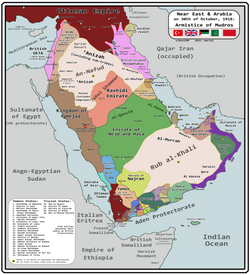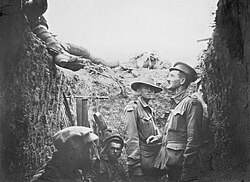Have you ever wondered why the Ottoman Empire joined the fight in World War 1? Understanding their reasons can change the way you see this massive conflict.
The Ottomans didn’t just jump in without cause—they had clear goals and fears driving their decisions. If you want to know what pushed them into one of history’s deadliest wars, keep reading. This story will give you a fresh perspective on the war and the empire’s role in shaping the world you live in today.

Credit: en.wikipedia.org
Ottoman Empire Before World War I
Before World War I, the Ottoman Empire was a vast but struggling realm facing numerous internal and external pressures. Understanding its state at this critical moment helps explain why it eventually chose to enter the war. The empire’s political, economic, and military conditions were complex and deeply intertwined.
Political Landscape
The Ottoman Empire was ruled by a sultan who held significant power but faced growing challenges from nationalist movements within its diverse population. Ethnic groups like the Arabs, Armenians, and Greeks sought greater autonomy or independence, weakening central control.
Additionally, the Young Turk Revolution of 1908 brought reformers who aimed to modernize the empire but also created political instability. You might wonder how a government trying to reform itself ended up making risky war decisions.
Economic Challenges
The empire struggled financially, with a large portion of its revenue going to repay foreign debts. Many regions were underdeveloped, limiting tax income and industrial growth.
Trade routes were losing importance as European powers controlled key maritime paths. This economic strain made it hard for the Ottoman government to fund necessary reforms or maintain its military strength effectively.
Military Strength
The Ottoman military had experienced some modernization but remained relatively weak compared to European powers. It relied heavily on German officers for training and organization, reflecting its dependency on foreign expertise.
Despite these efforts, the army suffered from outdated equipment and limited industrial capacity to produce weapons. You might ask how such a military could hope to defend a sprawling empire facing powerful enemies on multiple fronts.
Alliances And Diplomacy
The Ottoman Empire entered World War I not only due to internal reasons but also because of complex alliances and diplomacy. These relationships shaped their decisions and actions during the war. The empire’s ties with other powerful nations influenced its role on the global stage.
Relationship With Germany
The Ottomans found a strong ally in Germany. Germany offered military support and modern weapons. This partnership promised to strengthen the empire’s army. Both nations shared a common interest in challenging the Allied Powers. Their cooperation deepened through military training and joint plans.
Tensions With Allied Powers
The Ottoman Empire had long-standing conflicts with Britain, France, and Russia. These nations controlled many Ottoman lands or aimed to do so. Suspicion and rivalry grew between the Ottomans and the Allies. The empire feared losing more territory and influence. These tensions made peace difficult and pushed the Ottomans closer to Germany.
Strategic Agreements
The Ottomans signed key agreements to secure their position. They agreed to join the Central Powers in 1914. This alliance promised mutual defense against common enemies. The empire sought to protect its borders and regain lost lands. Strategic deals also aimed to improve trade and military cooperation. These agreements shaped the empire’s path during the war.
Territorial Ambitions
The Ottomans sought to regain lost lands and expand their empire during World War I. Territorial ambitions drove their alliance with Germany and entry into the war. Control over strategic regions promised power and influence in a changing world.
Territorial ambitions played a major role in the Ottoman Empire’s decision to join World War I. The Ottomans saw the war as a chance to protect and expand their territory. Understanding their ambitions helps explain why they chose to fight alongside the Central Powers.Preserving The Empire
The Ottomans aimed to keep their empire intact. They faced threats from European powers seeking to carve out their lands. They believed that fighting in the war would help them resist these encroachments. Protecting their borders was essential for their survival. Joining the war offered a way to defend against these threats.Expansion Goals
The Ottomans had dreams of expanding their territory. They wanted to regain lands lost in previous conflicts. The war provided an opportunity to achieve this. By siding with the Central Powers, they hoped to gain new territories. They also sought to strengthen their influence in the region.Control Over Key Regions
Control over strategic regions was crucial for the Ottomans. They aimed to dominate important waterways like the Suez Canal. This control would boost their power and trade. Securing these regions was vital for their economic interests. The war was a chance to assert their control over these key areas.Internal Pressures
The Ottoman Empire faced intense internal pressures before and during World War I. These pressures influenced their decision to join the conflict and shaped their wartime strategies. Understanding these internal dynamics helps you see why the empire was vulnerable and eager to assert control.
Nationalism And Ethnic Groups
The empire was home to many ethnic groups, each with its own identity and ambitions. Nationalist movements grew stronger, pushing for independence or greater autonomy. This unrest made it difficult for the Ottomans to maintain unity and control.
Imagine trying to lead a group where everyone wants to go a different way. The empire faced revolts and uprisings, draining resources and focus. This pressure pushed Ottoman leaders to seek alliances that might protect their rule.
Political Instability
Political power in the Ottoman Empire was fragile and often contested. Frequent changes in leadership and internal rivalries weakened the government. You can think of it like a ship with a shaky captain during a storm—decisions become riskier and less confident.
This instability made the empire more prone to external influence and less able to respond effectively to threats. The ruling elite hoped that entering the war would stabilize their position and suppress dissent.
Economic Hardships
The empire struggled with serious economic problems. Trade routes shifted, agricultural output declined, and debts piled up. Everyday life for many people worsened, increasing dissatisfaction with the government.
Facing these hardships, Ottoman leaders saw war as a chance to gain resources and territory. But economic struggles also meant the empire had fewer means to sustain a long conflict, complicating their war efforts.
Military Motivations
The Ottoman Empire’s decision to fight in World War I was deeply rooted in military motivations. These motivations were shaped by their desire to strengthen the army, secure the empire’s borders, and respond to growing external threats. Understanding these reasons gives you a clearer view of why the Ottomans chose to enter a conflict that would change their future dramatically.
Modernization Efforts
The Ottomans recognized that their military needed serious upgrades to compete with European powers. They worked hard to modernize their army, updating weapons, training, and tactics. This push was not just about keeping up—it was about survival.
You might wonder how modernization impacted morale. It boosted confidence among soldiers and officers, making them feel better prepared for battle. Yet, challenges remained, like limited resources and political instability, which slowed progress.
Military Leadership
Strong military leaders played a key role in pushing the Ottomans into the war. Commanders like Enver Pasha believed that joining the conflict was an opportunity to restore the empire’s power. Their decisions were often driven by a mix of ambition and a sense of duty.
These leaders also brought new strategies and discipline to the army. Their vision helped unite soldiers under a common cause, even when the odds were against them. Do you think leadership can change the course of a battle? For the Ottomans, it certainly made a difference.
Defense Against Threats
The Ottoman Empire faced constant pressure from neighboring countries and internal unrest. Fighting in World War I was partly about protecting their territories from invasion. They aimed to defend key regions like the Dardanelles and Mesopotamia to keep the empire intact.
Imagine the stress of defending your home under such conditions. This urgency pushed the Ottomans to take sides in the war, hoping an alliance would strengthen their position. Their military actions were as much about survival as they were about strategy.

Credit: en.wikipedia.org
Impact Of Global Politics
The impact of global politics shaped the Ottoman Empire’s decision to fight in World War I in profound ways. The empire was entangled in a web of declining power, external pressures, and shifting alliances. Understanding these factors helps you see why the Ottomans chose to enter a conflict that would ultimately transform their world.
Decline Of The Ottoman Empire
The Ottoman Empire was already weakening before World War I. Years of territorial losses and internal struggles had drained its strength.
You might wonder how a once-mighty empire ended up so vulnerable. Economic troubles and military defeats left the Ottomans desperate to protect what remained.
This decline created a sense of urgency. The empire sought allies who could help it survive in a rapidly changing global landscape.
Influence Of European Powers
European powers played a huge role in shaping Ottoman choices. Britain, France, and Russia were competing for influence over Ottoman lands.
They often supported local uprisings or pushed for territorial gains at the empire’s expense. You can see this as a form of political pressure that limited Ottoman options.
The Ottomans had to carefully navigate these pressures. Aligning with one power meant risking conflict with others, but staying neutral wasn’t easy either.
Role Of World War I Dynamics
World War I brought new dynamics that pulled the Ottomans into the conflict. The empire saw an opportunity to regain lost territories by joining the Central Powers.
Germany promised military and financial support, which appealed to Ottoman leaders eager to strengthen their position.
But this decision was risky. It forced the Ottomans into a global war that tested their already strained resources and alliances.
Credit: medium.com
Frequently Asked Questions
Why Did The Ottomans Join World War 1?
The Ottomans joined World War 1 to regain lost territories. They allied with Germany seeking military support against enemies. This alliance promised protection and opportunities to restore their empire’s power and influence.
What Role Did The Ottomans Play In Ww1?
The Ottomans fought mainly on the Middle Eastern front. They resisted British advances in Gallipoli and defended their empire against Allied forces. Their involvement significantly affected the war’s dynamics in the region.
How Did Ww1 Impact The Ottoman Empire?
WW1 led to the Ottoman Empire’s collapse. The war drained their resources and weakened their control. Post-war treaties divided their lands, ending centuries of Ottoman rule.
Which Countries Were The Ottomans Allied With In Ww1?
The Ottomans allied with Germany and Austria-Hungary. This Central Powers alliance aimed to counterbalance the Allies’ strength. Their cooperation shaped military strategies during the war.
Conclusion
The Ottoman Empire entered World War I to protect its lands and power. They hoped to regain lost territory and stop enemies around them. Their alliance with Germany shaped many decisions during the war. Fighting helped the Ottomans stay part of global politics for a while.
Understanding their reasons shows how complex history can be. The war changed the empire and the world forever. History teaches us about the causes and effects of such conflicts. It reminds us to learn from the past.





